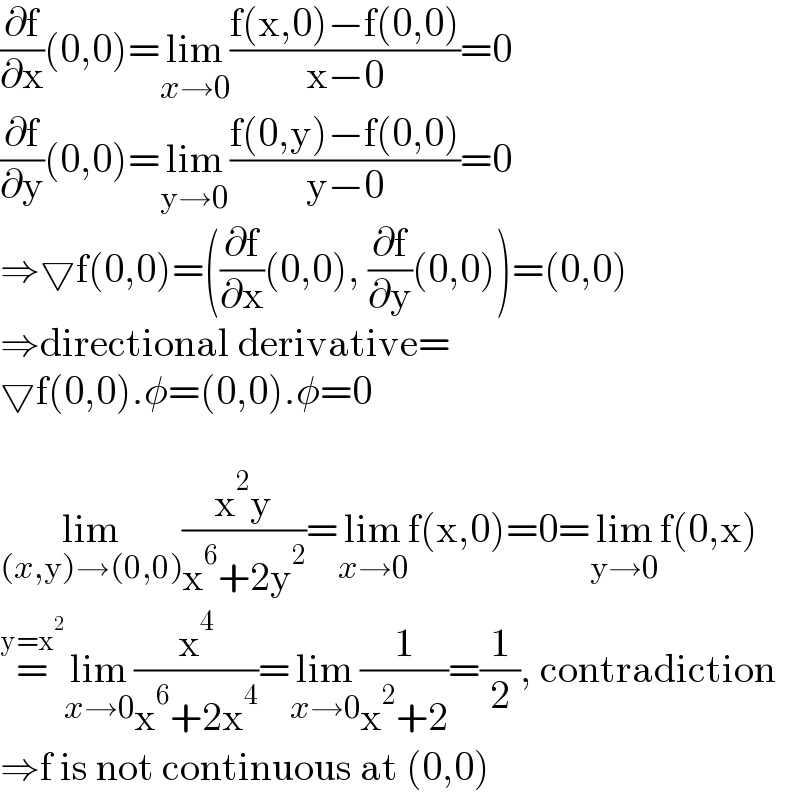
Question Number 192138 by Mastermind last updated on 09/May/23

$$\mathrm{show}\:\mathrm{that}\: \\ $$$$\mathrm{f}\left(\mathrm{x},\mathrm{y}\right)\:=\:\left\{_{\mathrm{0}\:\:\:\:\:\:\:\:\:\:\:\:\:\:\:\:\:\:\:\:\:\:\:\:\:\:\:\left(\mathrm{x},\mathrm{y}\right)=\left(\mathrm{0},\mathrm{0}\right)} ^{\frac{\mathrm{x}^{\mathrm{2}} \mathrm{y}}{\mathrm{x}^{\mathrm{6}} \:+\:\mathrm{2y}^{\mathrm{2}} }\:\:\:\:\:\:\:\:\:\:\:\:\left(\mathrm{x},\mathrm{y}\right)\neq\:\left(\mathrm{0},\mathrm{0}\right)} \right. \\ $$$$\mathrm{has}\:\mathrm{a}\:\mathrm{directional}\:\mathrm{derivative}\:\mathrm{in}\:\mathrm{the} \\ $$$$\mathrm{direction}\:\mathrm{of}\:\mathrm{an}\:\mathrm{arbitrary}\:\mathrm{unit}\:\mathrm{vector} \\ $$$$\phi\:\mathrm{at}\:\left(\mathrm{0},\mathrm{0}\right),\:\mathrm{but}\:\mathrm{f}\:\:\mathrm{is}\:\mathrm{not}\:\mathrm{continous}\:\mathrm{at}\:\left(\mathrm{0},\mathrm{0}\right)\: \\ $$
Answered by gatocomcirrose last updated on 09/May/23

$$\frac{\partial\mathrm{f}}{\partial\mathrm{x}}\left(\mathrm{0},\mathrm{0}\right)=\underset{{x}\rightarrow\mathrm{0}} {\mathrm{lim}}\frac{\mathrm{f}\left(\mathrm{x},\mathrm{0}\right)−\mathrm{f}\left(\mathrm{0},\mathrm{0}\right)}{\mathrm{x}−\mathrm{0}}=\mathrm{0} \\ $$$$\frac{\partial\mathrm{f}}{\partial\mathrm{y}}\left(\mathrm{0},\mathrm{0}\right)=\underset{\mathrm{y}\rightarrow\mathrm{0}} {\mathrm{lim}}\frac{\mathrm{f}\left(\mathrm{0},\mathrm{y}\right)−\mathrm{f}\left(\mathrm{0},\mathrm{0}\right)}{\mathrm{y}−\mathrm{0}}=\mathrm{0} \\ $$$$\Rightarrow\bigtriangledown\mathrm{f}\left(\mathrm{0},\mathrm{0}\right)=\left(\frac{\partial\mathrm{f}}{\partial\mathrm{x}}\left(\mathrm{0},\mathrm{0}\right),\:\frac{\partial\mathrm{f}}{\partial\mathrm{y}}\left(\mathrm{0},\mathrm{0}\right)\right)=\left(\mathrm{0},\mathrm{0}\right) \\ $$$$\Rightarrow\mathrm{directional}\:\mathrm{derivative}= \\ $$$$\bigtriangledown\mathrm{f}\left(\mathrm{0},\mathrm{0}\right).\phi=\left(\mathrm{0},\mathrm{0}\right).\phi=\mathrm{0} \\ $$$$ \\ $$$$\underset{\left({x},\mathrm{y}\right)\rightarrow\left(\mathrm{0},\mathrm{0}\right)} {\mathrm{lim}}\frac{\mathrm{x}^{\mathrm{2}} \mathrm{y}}{\mathrm{x}^{\mathrm{6}} +\mathrm{2y}^{\mathrm{2}} }=\underset{{x}\rightarrow\mathrm{0}} {\mathrm{lim}f}\left(\mathrm{x},\mathrm{0}\right)=\mathrm{0}=\underset{\mathrm{y}\rightarrow\mathrm{0}} {\mathrm{lim}f}\left(\mathrm{0},\mathrm{x}\right) \\ $$$$\overset{\mathrm{y}=\mathrm{x}^{\mathrm{2}} } {=}\underset{{x}\rightarrow\mathrm{0}} {\mathrm{lim}}\frac{\mathrm{x}^{\mathrm{4}} }{\mathrm{x}^{\mathrm{6}} +\mathrm{2x}^{\mathrm{4}} }=\underset{{x}\rightarrow\mathrm{0}} {\mathrm{lim}}\frac{\mathrm{1}}{\mathrm{x}^{\mathrm{2}} +\mathrm{2}}=\frac{\mathrm{1}}{\mathrm{2}},\:\mathrm{contradiction} \\ $$$$\Rightarrow\mathrm{f}\:\mathrm{is}\:\mathrm{not}\:\mathrm{continuous}\:\mathrm{at}\:\left(\mathrm{0},\mathrm{0}\right) \\ $$
Commented by Mastermind last updated on 14/May/23

$$\mathrm{Thank}\:\mathrm{you}\:\mathrm{so}\:\mathrm{much}\:\mathrm{BOSS} \\ $$
